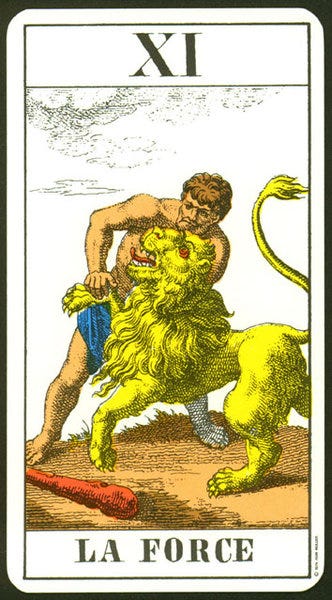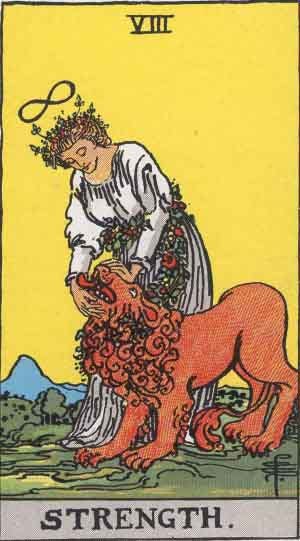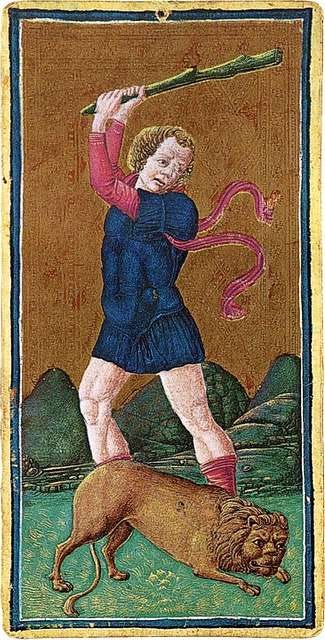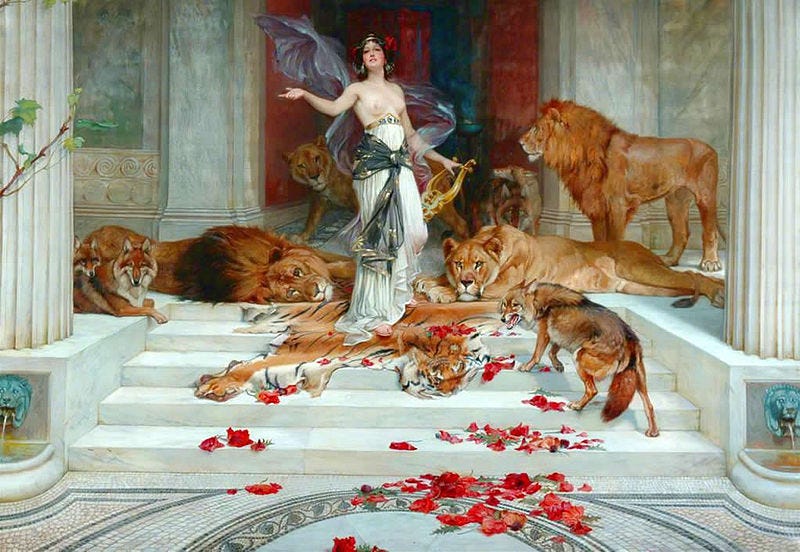Writing Lessons from the Strength Card (Part 1)
On how to find your inner FU, the lion as muse, and more
If you’re a Tarot enthusiast, you probably know that 2024 adds up to the number 8, which is the Strength card. This card features a woman who looks much like the Empress either opening or closing the mouth of a lion. A flower garland snakes around the curves of her flowing white dress. An infinity sign hovers over her head like a halo.
What does this mean for our writing journey in the year ahead?
In its positive aspect this card can mean that you have the strength to face whatever you’re going through. In what I consider a shadow side, it can indicate that you need to tame your animal instincts, re-enforcing a false hierarchy of human/animal.
But I like Amanda Yates Garcia’s interpretation of the lion as our muse better. (1)
Why? Our best instincts for writing are actually just that: instincts. As the poet Gerard Manley Hopkins wrote “there lives the dearest freshness, deep down things.” (2) That’s how I see nature, which includes humans and our desires, including the desire to write. Perhaps Amanda’s interpretation of the lion as a muse resonates with me because after both the privilege and the pain of three advanced degrees in creative writing (see The Fool card), I relate more to the lion than the woman in white.
My writing has been harshly criticized within academia and elsewhere. I took it on the chin because that’s what the toxic masculinity of the writing industry says to do. Taking feedback and revising is crucial to becoming a writer. There’s certainly truth to this as about 90% of writing is revising.
However, there is a kind way to deliver feedback that we can see in the gentle touch of the woman resting her hand on the lion’s mouth. It’s also essential to read a student’s or peer’s work closely, and consider what the piece is trying to become, rather than imposing your own will. If you are the student, extend this care to yourself even in the face of critique.
The Rider-Waite Colman-Smith version of the card with the woman and the lion illustrates soft power or power-with, as Rachel Pollack writes her book 78 Degrees of Wisdom: A Tarot Journey to Self-Awareness. (3) Previous renditions of the card emphasized dominance or power-over.

What I wish I could have told my younger self: not all feedback is meant to be taken, even if it’s given by an authority. Consider if the feedback is coming from a place of love or dominance.
I remember a time when my younger self did draw on her strength to stand by her work. I was 29 years old and in my second year at an MFA program. Like most of the students, I looked up to the professors as gods who had the power to say “yes, you’re a writer” or “no, you’re terrible.” I realize now no one has that power unless you give that to them.
I was taking a class with a professor I’d always found warm and big-hearted like a lion. But my poem “Samsara” provoked outrage from him because it didn’t do what he thought a poem should do. It wasn’t a circus lion performing well but a wild lion roaring, tearing after a gazelle on the savannah. It hurt me when he railed against the poem. It seemed to truly offend him. (4)
My true nature — my lion, my muse — said the poem was good.
She spoke in the voice of the witch — in leaping flames and tidal waves, cracked eggs and fistfuls of soil.
After a year of contorting myself and my work to please professors just like most of the other students, I found my inner Fuck You. This is like intuition with a kick. Perhaps I drew on my Masshole, raw, working-class self, when I found the courage to stand by my poem exactly as it was, without changing a word. Perhaps I drew on the strength of the little girl who lost her dad at seven years old, and vowed to resurrect him in writing. Perhaps it was the young woman who moved to San Francisco with no money, job or contacts and made it work, and then to Prague…perhaps I drew on the muse who had fed me and helped me survive my entire life.
I met the professor in a cafe in the hope we could return to the friendly, easy-going rapport we’d had prior. He opened the meeting with a brutally cold “How can I help you?” This was another whip crack against my lion or muse. I can’t remember much of that conversation except feeling shamed as though my poem needed “fixing” and also the conviction that this was not what it needed. I never said “Fuck You” out loud, of course, but I felt it as a force inside.
Circling back to the imagery on the Strength card: The Empress (who represents the goddess) is either opening or shutting the mouth of a lion. In this meeting, I stood my ground in love without lashing out and offending the professor (I hope). This is one of the lessons of the Strength card.
Within a year, “Samsara” had been published in the magazine Pleiades. Three years after that, I was accepted as the only fellow out of hundreds of applicants at a doctoral program based on a writing portfolio that included “Samsara.” Within another three years, “Samsara” became the title poem of my first book of poetry, which won an award from Noemi Press.

What one person had despised, other people loved.
But you might have noticed the journey from writing the poem to publishing the book took seven years. How did I keep my faith and confidence during that time? The answer is I nurtured myself with the support that had generously been extended to me: the publication of the poem in Pleiades, and my doctoral fellowship allowed me more time to work and play with supportive peers. (I’ll be writing about three of these Empresses in an upcoming post.)
Writing is a game of endurance. You need to love your lion when she isn’t in the spotlight, earning money or praise, just like you’d love a pet even if they weren’t getting a million followers.
As Amanda Yates Garcia says about the Strength card: it indicates co-creating with your lion, being vulnerable enough to speak, being vulnerable enough to listen, and opening in receptivity to the muse. This doesn’t mean you never revise! I had revised “Samsara” rigorously before turning it into workshop, and believe in the necessity of revision. It’s just important to check in with your muse to see if revision is what’s needed.
Lions, like your muse, are wild and not meant to be tamed. It’s not in their nature.
So why would the Empress be engaged in the impossible feat of taming the lion? I don’t think she is. She’s in loving relationship with the lion.
Treat your muse with care and respect, and she’ll show up for you with fierce devotion.
Writing teachers can teach craft. What we can’t teach but we can encourage is loving your lion. We can create spaces where the lion of creativity is truly king.
If you’re interested in learning more about how to sustain a writing practice, even while writing about hard things, experiencing rejection, and more, check out our new offering Writing as Healing. (5)
This Week’s Lessons from the Strength Card
Treat your muse or lion with care and respect. Speak gently with them as you would a child or pet you loved.
Take feedback with a grain of salt. Tune in to your intuition to see if the feedback is given out of love or dominance.
Don’t abandon your lion by trying to please everyone. Believe in your work and stand by it with love. This doesn’t mean stubbornly refusing to revise all the time; it means checking in with your muse or lion before making a conscious decision.
FOOTNOTES
Amanda Yates Garcia interprets the lion as the muse in the Strength episode of her podcast Between the Worlds.
“God’s Grandeur” by Gerard Manley Hopkins. Don’t let the title fool you. Hopkins is often considered a pagan poet.
“78 Degrees of Wisdom: A Tarot Journey to Self-Awareness” by Rachel Pollack
Is this called “spilling the tea”? I actually have a lot of fondness and respect for this professor. I’m grateful for the lesson I learned from him here, and in his poetry seminars.
“Writing as a Way of Healing” by Louise DeSalvo. She offers a plan on how to treat yourself with compassion while writing and finishing projects. Beth Brewer (LCSW) and I will be using her book as the framework for our upcoming class “Writing as Healing.”
SALE ON JANUARY CLASSES AT WITCH LIT (www.witchlit.us)
Writing the Strange: 6 Weeks, 6 Senses begins 1/14 on Zoom. Take 50% off with code STRENGTH50. Offer ends 1/8 at midnight EST. Only 3 spots left!🔥
What have you survived, dear reader? What have you accomplished against all odds? This is your strength. Let that lion roar and purr on the page. Have you ever had to find your inner FU in the face of a critic who was imposing their will onto your work? I’ll be discussing what Julia Cameron calls “creative monsters” and how to overcome them in upcoming posts.
Feel free to make any other comments you’d like or ask me questions here as well!







